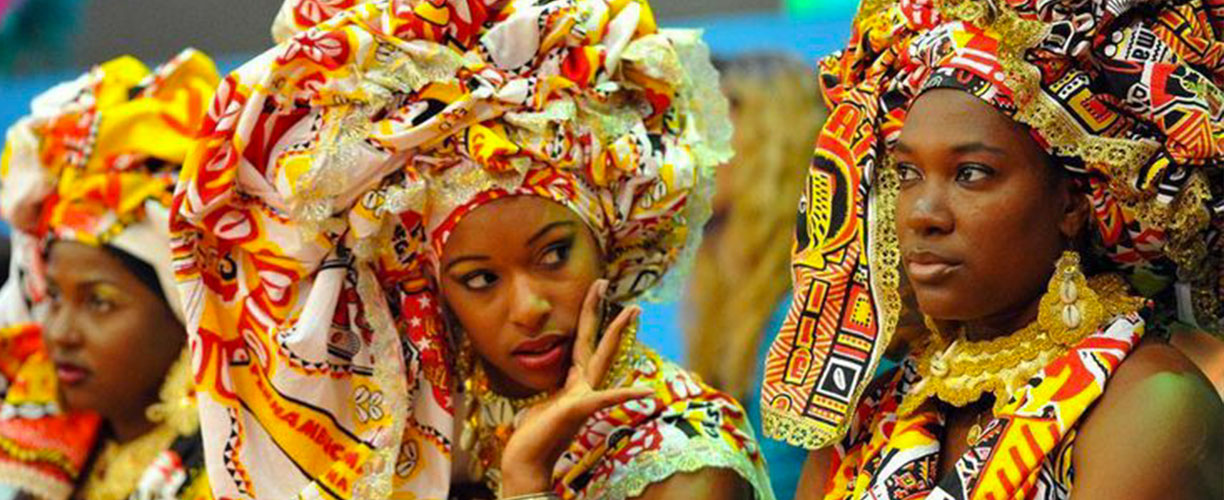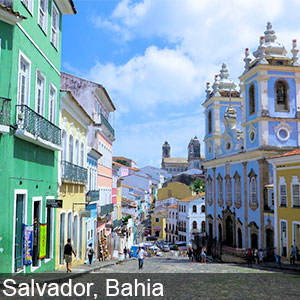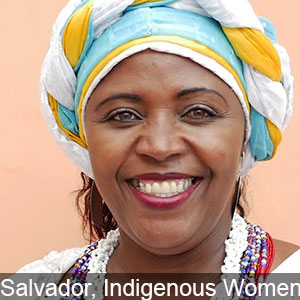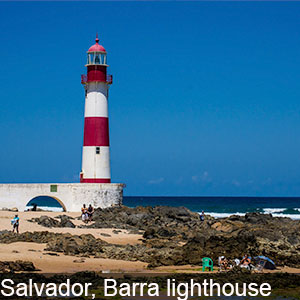
Afro-Brazil, Salvador Bahia
Overview / Highlights
5 NIGHTS / 6 DAYSSalvador, capital of the state of Bahia, the first major port and the capital of colonial Brazil for almost two centuries. Everything from Carnival to government ceremonies in Bahia honors Salvador's African spirit. The city's motto, terra da alegría (land of happiness), stems from its proud African history, music, and culture of resilience. The city is situated between green tropical hills and broad beaches along the bay of Todos os Santos. It was built on two levels with administration buildings and residences constructed on the hills; forts, docks, and warehouses on the beaches. To this day the city is still divided into upper and lower cities. From 1500 to 1815 Salvador was the nation's busiest port. A significant portion of the sugar from the northeast and gold and diamonds from the mines in the southeast passed through Salvador. It was a golden age for the town; magnificent homes and churches resplendent in gold decoration were built. Many of the city's baroque churches, private homes, squares, and even the hand-chipped paving bricks have been preserved as part of Brazil's historic patrimony. In Salvador, more than anywhere else in the country, the African influence in the makeup of Brazilian culture is readily visible, from the spicy dishes still called by their African names (caruru, vatapa, acaraji), to the ceremonies of candomblé which honor both African deities and Catholic holidays, to the capoeira schools where a unique African form of ritualistic fighting is taught.
CountriesBrazil | CitiesSalvador (Bahia), Praia do Forte, Cachoeira |
Tour Program Summery Outline
| Click |
Features
|
|
Interest
Adventure / Beaches / COSMOPOLITAN CITIES / CULINARY /Cruises / Cultural / ECO TOURS / FAMILY ADVENTURES / FLORA / Historical / LUXURY / Nightlife



Day 01: Arrive Salvador, State of Bahia (City Tour)
Welcome to Salvador, capital of the state of Bahia, first capital of colonial Brazil for almost two centuries beginning in 1549. Designated a world Heritage Site, Salvador de Bahia witnessed the blending of European, African and Amerindian cultures and served as the first slave market in the New World. The city lies between green tropical hills and broad beaches along the bay of Todos os Santos. It was built on two levels with administration buildings and residences constructed on the hills; forts, docks, and warehouses on the beaches and managed to preserve many outstanding Renaissance buildings.Salvador maintains its African identity, brought through the transatlantic slave trade from the coast of Africa to Brazil. During the Portuguese colonization, the Bay of All Saints was of fundamental importance as the main exportation port in the Southern Hemisphere, from which products such as Brazilian sugar and Bolivian silver were sent to European metropolises. Moreover, it was a port of intense circulation of African slaves in the New World. Today's tour was designed to deliver special attention and knowledge about the transatlantic slave trade and its legacy through key historical sites of the city of Salvador. Our tour begins at the Fort and Lighthouse Barra, one of the ports of arrival of enslaved Africans in the city. We will proceed to the Tororó dike and visit the monument dedicated to the valuable legacy of African religious heritage through the worship of Orixas. The next sites are located in the Cidade Baixa (Lower City), where we will visit other central locations in the historical processes that mark the presence of Africans in Bahia and Brazil. Next, we visit the old historical section of town, the Pelourinho area, with the largest and best-preserved complex of colonial architecture in the Americas. Here, in front of the central slave market, we trace the African roots of Salvador visiting the Afro-Brazilian Museum which houses the superb wooden, sculpted panels of the orixá's by Salvador's most celebrated artist, Carybé. We visit the Church of Our Lady of the Rosary, the famous Black church, built with meager resources over a period of almost 100 years. The buildings may be European, but the spirit is truly African. Time permitting, we will also visit the Society for Black Protection, an organization led by former slaves and dedicated to promoting the liberation of enslaved Africans and their decedents. Return to your hotel for overnight. (B)
Day 02: Salvador (Praia do Forte)
The scenic Coconut Highway leads to Praia do Forte, a fishing village some 50 miles north of Salvador, home to some of the best beaches in Bahia. As we make our way north the appearance of the distinctive white sands of the sparse restinga vegetation signals that we are approaching Praia do Forte. First we visit the ruins of the imposing Garcia D´Ávila castle (1556), once the home of the largest landowner in the New World, set on the lands of what was the first farm in Brazil. From here we have a panoramic view of the northern coastline.Lunch time sees us in the village of Praia do Forte. After lunch we visit headquarters of the TAMAR Project, the national sea turtle preservation project and one of Brazil's most successful ecological programs. The visitors´ center provides a unique up-close view of these majestic animals. Then time to relax on the beach or browse in the many local handicrafts stores before returning to Salvador. (B,L)
Day 03: Salvador (Cachoeira)
Today drive through historical farmlands, making our way past plantations, peaceful colonial towns, and busy country markets en-route to Cachoeira. The small colonial city of Cachoeira is the historic centre of the Recôncavo region. During the colonial times the Recôncavo became the major agricultural centre of the country and sugar cane was its major produce. This rural development provoked the massive importation of African slaves, and their descendants today populate the region. Visit a cocoa plantation and stop at the city of Santo Amaro, birthplace of singers Maria Bethânia and Caetano Veloso. Arrive in Cachoeira at the end of the morning and have lunch in the Pousada do Carmo, an old convent transformed into a hotel and restaurant. Cachoeira is home to countless churches and is headquarters of the Irmandade da Boa Morte (The Sisterhood of the Good Death). Created in the 19th century to relieve the suffering of the slaves, Boa Morte is one of the most representative expressions of religious blending in the Country. Late afternoon return to Salvador and your hotel. (B,L)Day 04: Salvador (Percussion and Dance Workshops & Bahia by Night Tour)
This morning we focus on rhythms from the candomblé, samba and samba reggae. Students will learn from master percussionists the subtleties of Brazilian percussion. The workshop will cater for all, no previous musical training or experience is necessary. The drum is the most important instrument in Bahia culture and this experience is to be not missed.This afternoon a dance workshop. Here we will focus on Samba and street dances, touching on some of the rhythms from yesterday's workshop. In the Afternoon we visit the Regional Capoeira school where we focus on the variations of the capoeira: There was a movement in the 1930's, under the notorious Brazilian dictator Getúlio Vargas, to create a unique Brazilian sport. A Bahian capoeira master, Mestre Bimba, was given the task of adapting the Angolan capoeira to a new distinctly Brazilian form of capoeira. The other form, Capoeira Regional, was born. This form is faster, indeed flashier, than the original Capoeira Angola, where the blows are directed to the head in a spectacular display of strength, technique and control.
Tonight, enjoy dinner and folklore show by Balé Folclórico da Bahia and dinner in Pelourinho. The performance by the internationally famous Balé Folclórico da Bahia in the Miguel Santana Theatre in the Pelourinho area is a showcase of the different African traditions still so much alive in Bahia. We will see the sacred dances of the Candomblé; puxada de rede, a song by fishermen in honor of Yemanjá, the goddess of the sea; maculelê, a stick and sword dance with its origins in the cane fields; capoeira, a martial art/dance of Angolan origin and the samba de roda, a spinning, swirling version of this exuberant national dance. Return to your hotel for overnight. (B,D)
Day 05: Salvador (Urban Development, Capoeira School, Dinner & Show)
This tour a special treat as we visit off the beaten path section of the city, a region not typically visited by most visitors to Salvador. We will see the different realities of urban life for the fortunate and the less fortunate. Our tour ends in an inner-city community, a favela deep in the heart of some of the most exclusive residential areas of Salvador. We will be met by the community leaders and given a detailed explanation of the work being done within the community. We will visit the school, and children's day-care center. This is a warming example of a community bravely finding solutions for its problemsNext a visit to to a Regional Capoeira School where we focus on the variations of the capoeira: There was a movement in the 1930's, under the notorious Brazilian dictator Getúlio Vargas, to create a unique Brazilian sport. A Bahian capoeira master, Mestre Bimba, was given the task of adapting the Angolan capoeira to a new distinctly Brazilian form of capoeira. The other form, Capoeira Regional, was born. This form is faster, indeed flashier, than the original Capoeira Angola, where the blows are directed to the head in a spectacular display of strength, technique and control. The musical form for the Capoeira Regional is similar to the Angolan form, a faster, stronger rhythm but using only the berimbau, tambourine and conga. Both forms have their intrinsic qualities, the Angolan form is certainly subtler then the more "gung-ho" Regional form.
Tonight, a feast for the senses as we head down to Miguel Santana Theatre in the Pelourinhofor an amazing show. The Bahia Folklore Company (Balé Folclórico da Bahia) is one of the most respected folklore dance troupes in the world. The company performs in the intimate Miguel Santana Theatre in the Pelourinho in a seamless presentation of the multiple African traditions that underpin Bahian culture. We will see the sacred dances of the Candomblé; puxada de rede, a song by fishermen in honor of Yemanjá, the goddess of the sea; maculelê, an acrobatic stick and sword dance with origins in the cane fields; capoeira, a martial art/dance of Angolan origin and the samba de roda, a spinning, swirling version of this exuberant national dance. Note: Not available Tuesday and Sunday. Dinner at a local restaurant and return to the hotel for overnight. (B)
Day 06: Depart Salvador
Morning at leisure. Afternoon transfer from the hotel to the airport for your flight back home (B)Remarks
Not Included:- Alcoholic or non-alcoholic beverages
- International or domestic airfares
- Cost of Medical Emergencies including evacuation
- Gratuities
- Souvenirs or additional services
- Travel insurance
- Cost of relevant visas
- Anything else not listed as included
